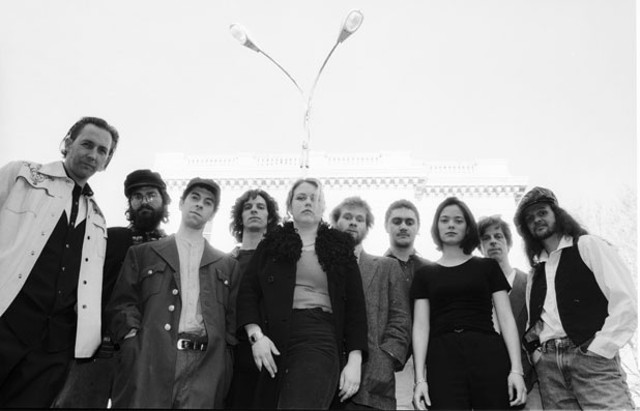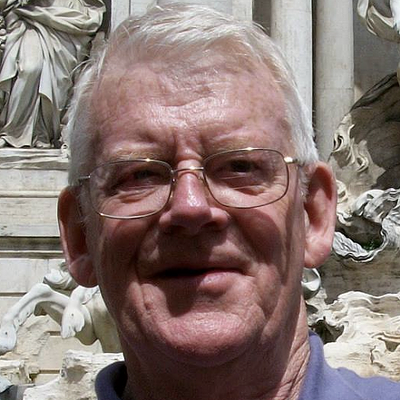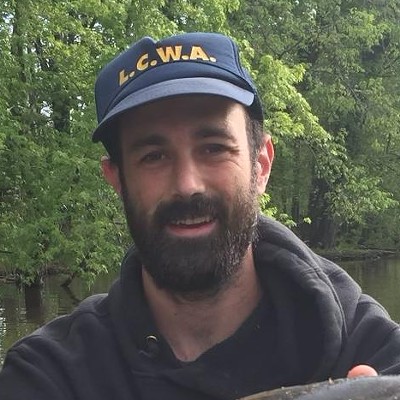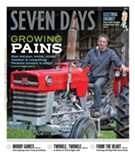Published June 8, 2011 at 9:59 a.m.
The year was 2001. The first film in the Harry Potter series was the year’s top-grossing movie, narrowly edging out the first installment in the Lord of the Rings trilogy. Time Warner merged with America Online. A Republican senator, Jim Jeffords of Vermont, shifted the balance of power by becoming an Independent. John Lee Hooker, George Harrison, Dale Earnhardt and Ken Kesey died. A tragedy on a bright September morning changed the country forever. And somewhere in upstate New York — Syracuse? — viperHouse unceremoniously played their final show, ending the group’s run as one of Vermont’s most successful and innovative ensembles of the era.
A decade later, viperHouse are back, playing a reunion show this Thursday as part of the 2011 Burlington Discover Jazz Festival.
The band formed in 1995 under the watch of composer and multi-instrumentalist Michael Chorney, who has, since viperHouse’s demise, gone on to lead a number of other local groups and earn international renown for his contributions to Anaïs Mitchell’s folk opera Hadestown. At the time, Chorney had been playing saxophone with another Vermont combo, the So-Called Jazz Quintet, but was looking for a new outlet.
“I had this idea to put together a big band,” says Chorney. Indeed, viperHouse’s original lineup boasted as many as 10 members. It reads like the roster of an all-star band: keyboardist Ray Paczkowski (Trey Anastasio Band); vocalist and flute player Heloise Williams (Heloise & the Savoir Faire); guitarist Brett Hughes (Chrome Cowboys, Ramble Dove); bassist Rob Morse (Vorcza, yoUSAy Placate); and drummer Phil Carr, trumpeter Brian Boyes, violinist Karen Quinn, percussionist PJ Davidian and trombonist Dan Mallach. The band was also multigenerational — its youngest member was Morse at 17, its oldest, Carr, then 40.
“The big thing was to find people whose chemistry I felt would work together,” says Chorney.
He describes the local music scene in the mid- to late 1990s as saturated with jam bands and jazz-funk hybrid acts, neither of which particularly excited him.
“A lot of what was going on in the scene in Burlington at the time was under this umbrella of acid jazz,” Chorney says. “I wasn’t interested in that at all, really. But I saw it as a good in for folks to go out and listen to interesting horn arrangements and improvisation.”
Because of the prevalence of the genre at the time, and because the band featured horns and explosive improvisation, viperHouse were often lumped into the category of acid jazz, a description that makes Chorney bristle.
“We weren’t ‘acid jazz’ at all,” he says. “We were trying to subvert that.” He goes on to describe the band’s “twofold mission.”
The first aspect of the viperHouse ethos was to trick audiences into appreciating more cultured instrumental arrangements under the guise of high-octane dance music. “We wanted to be able to sneak in arrangements that were hopefully sophisticated somewhat, while there was an incredibly driving groove going on,” Chorney explains.
The second prong of their attack was to improvise as an ensemble, rather than as individual pieces.
“A lot of times [in] bands with horns, it’s like you’ve got the tune, and the horns are playing the chart. They’re a layer,” Chorney says. “Rather than that, we tried to approach the thing kind of like a big band that operated as a small quartet, with cross-communication going on between all of the players, not just a section.”
Chorney concedes that keeping those lines of communication open while composing for such a large ensemble was often unwieldy.
“But we really got good at it,” says Chorney. “That was the central magic of the band.”
“We weren’t just trying to be a party band,” says Morse. “There was more adventurous content than what you find in most similarly sized bands who were just trying to do the funk thing.”
Steve Lemcke was a critic for the Burlington Free Press during the band’s heyday. He agrees viperHouse elevated their music beyond what most dance bands were doing at the time.
“You definitely had your moments to dance and grind,” Lemcke says. “But it was their musicality that made them different … They just had a different vibe. They were sometimes a bit darker, a bit heavier. But they could blast out the fun, happier jams with the best of them.”
Morse points out that the group explored suites of music by an unlikely assortment of composers, such as Nino Rota, Duke Ellington and Sun Ra. “And we stretched out a lot,” he says. “We were sort of a jam band in that respect, but coming at it from a nonrock perspective.”
“ViperHouse could jam, but it always felt like there was a hesitance to do so for very long,” adds Lemcke. “What made them better than others is that there was a path, a structure that seemed to keep them from meandering too far off the road and crash and burn.”
“There was a lot of improvisation … and with us it could be a duo, or a full-on group improvisation where the whole band was in on it,” Morse says. “We called those ‘asteroid collisions.’”
ViperHouse put out four albums in five years. Given their reputation for incendiary live shows, perhaps it’s not surprising that Chorney’s favorite was a live record, Ottawa.
In 1997, the band played the Ottawa Jazz Festival. But two hours before getting on stage, they discovered their van had been broken into and burglarized. Festival organizers scrambled to find instruments for the band to play.
“It was a beautiful show, actually, very emotionally charged,” recalls Chorney.
Driving home, the band listened to cassettes of the show taped from the soundboard — “Because people still listened to cassettes then,” he says. To their surprise, the tapes actually sounded pretty good.
“We got this idea to put out a limited-edition live album, 1000 CDs,” says Chorney. “We were like, Let’s do it within the next two weeks, put out the story that we got ripped off. Basically be our own insurance company. And it worked.”
The band was able to recoup enough money to replace instruments. Chorney recently discovered a small stash of about 20 CDs in a closet; they’ll be available at this week’s show.
Eventually, all good things must come to an end. In 2000, Williams, Davidian, Mallach and Boyes left viperHouse to pursue other projects.
“These were young people,” says Chorney. “They were at a time of change in their lives.”
ViperHouse continued touring as a reconfigured sextet, but the experiment was short lived.
“It sounded good — wonderful, actually,” Chorney says of the band’s second incarnation. “But having a big band was becoming almost impossible to sustain. We had done a pretty good job of it, but it was getting hard. And there is a time to end everything.”
And there’s a time to come back. For Thursday’s show, the band returns almost all of its original pieces, though Andrew Moroz and Caleb Elder will fill in for Mallach and Quinn on trombone and violin, respectively. Saxophonist Zach Tonnissen, a frequent collaborator with Chorney, will take the stage, as well.
Chorney says the band will draw on its entire repertoire for Thursday’s show, though he notes the emphasis will be on later material.
“That’s some of our better stuff,” he says. “But we’re even doing stuff from the first record.” Chorney opines that the band’s material has stood the test of time.
“It doesn’t sound like it’s from a certain time,” he says. “It doesn’t sound like ’90s music, you know?”
“It’s classic, timeless dance music,” adds Williams.
Morse concurs. “Part of the reason we were unique is that the music felt timeless back then. And still feels like it is,” he says. “It wasn’t about the mid-’90s or late ’90s — although we made some choices musically then that we might not now. It’s a joy to bring it back.”
That joy is amplified by the band members’ individual musical growth in the time since.
“The 10-years-later experience factor is pretty amazing,” says Chorney of his bandmates. “It’s wild to hear them now.”
So, is it possible viperHouse will be even better a decade later?
“‘Better’ is a funny term,” says Chorney. “It will be different, that’s for sure.”
Want to hear for yourself?
ViperHouse perform this Thursday, June 9, at 6 p.m. at the Burlington Waterfront Park Tent as part of the 2011 Burlington Discover Jazz Festival. $18/25. AA. Bonerama and the Joshua Panda Band open.
More By This Author
Speaking of...
-

Two Local Band Directors March in the Macy's Parade
Nov 22, 2023 -

Before a Burlington Show, the Wood Brothers Get Back to Basics
Oct 26, 2023 -

After a Half-Century of Leading Local Ensembles, Steven and Kathy Light Prepare a Musical Farewell
May 3, 2023 -

Double E 2023 Summer Concert Series Kicks Off With the Wailers
Mar 17, 2023 -

UVM’s New School of the Arts Gathers Many Creative Disciplines Under One Roof
Sep 14, 2022 - More »
Comments
Comments are closed.
From 2014-2020, Seven Days allowed readers to comment on all stories posted on our website. While we've appreciated the suggestions and insights, right now Seven Days is prioritizing our core mission — producing high-quality, responsible local journalism — over moderating online debates between readers.
To criticize, correct or praise our reporting, please send us a letter to the editor or send us a tip. We’ll check it out and report the results.
Online comments may return when we have better tech tools for managing them. Thanks for reading.















































